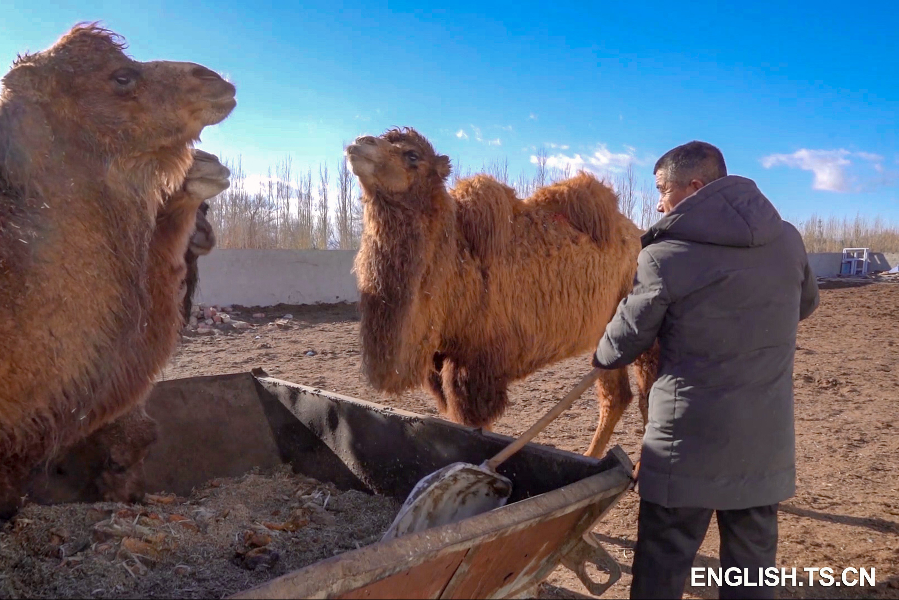Tianshannet-Xinjiang Daily (Reporter Wei Yonggui, Correspondent Liu Yahui) news: On November 26, in front of a breeding greenhouse, a group of camels, arranged in a circle, raised their heads in response to calls. “Number 1, come here,” “Number 2, come here,” “Number 3, come here”… Following the designated order, they walked steadily into the farm one by one.
Several farmers and herdsmen, who came to learn camel farming techniques, widened their eyes at this incredible scene.
“The camels here can understand my words. Camels are actually very intelligent. If you spend time with them every day, feed them grass, give them water, and chat with them, they naturally understand your words,” said Kasimu Ehmed, the “camel caller.”
Kasimu, in his sixties, is a villager from Xiamaya Township, Yiwu County, Hami City. He grew up in Xiamaya Township and is an expert in raising cattle, sheep, and camels.

Photo taken on November 21, 2023 shows Kasimu Ehmed, head of Zhonghe Camel Farming Specialized Cooperative in Xiamaya Township, Yiwu County, feeds camels at the farm. (Photo by Liu Yahui)
In 2015, with the support of Hami City and Yiwu County, Xiamaya Township implemented a poverty alleviation project. Each impoverished household was provided with two camels, and a specialized camel farming cooperative was established. The cooperative took charge of farming management, and by the end of the year, profits were distributed to the impoverished households, helping them increase their income.
As for who would take the lead in the cooperative, the fellow villagers unanimously elected Kasimu. After careful consideration, the township Party committee also believed that Kasimu, known for his fairness and great breeding skills, was a suitable candidate to manage the cooperative, and thus, they entrusted it to him.
“I know how to raise camels, but I’ve never managed a cooperative. At that time, I was tremendously stressful, and my biggest concern was that I might hinder the poverty alleviation efforts.” After contemplating for several days, Kasimu eventually agreed to take on the responsibility.
Zhonghe Camel Farming Specialized Cooperative was established in Xiamaya Township, gathering a total of 150 camels, and Kasimu became the person in charge.
Although the farmers and herders in Xiamaya Township have a tradition of raising camels, each household usually raises only two or three, making it easier to manage. They just sell camel wool and camel milk to earn a little extra income. Now, with centralized farming, troubles came one after another: disease prevention and control, hiring labor, preserving camel milk, and marketing sales. Kasimu works tirelessly from morning to night, and his face has tanned, but the cooperative’s benefits have not improved. In the second year of the cooperative’s establishment, due to the poor sales of camel milk, there was no fund to fulfill the year-end bonus promised at the beginning of the year. Kasimu sold more than 600 sheep from his own flock to distribute bonuses to cooperative members.
Just at this time, relevant departments in Hami City and Yiwu County promptly extended a helping hand.
In 2017, Yiwu County brought in an investor, Xinjiang Zhongtuo Biotechnology Co., Ltd (hereinafter referred to as “Zhongtuo Company”), a Henan enterprise engaged in the pairing-assistance to Xinjiang. With the coordination of the county’s Poverty Alleviation Office, Zhongtuo Company concluded an order with the Zhonghe Camel Farming Specialized Cooperative to purchase camel milk at a price of RMB 19 to 21 per kilogram. Yiwu County also provided a subsidy of RMB 3 per kilogram of camel milk to the cooperative.
With the issue of camel milk sales promptly resolved, the cooperative embarked on a new path of development.
“The camel milk market is expanding, and we are growing alongside the company, and the benefits are also improving,” said Kasimu. The price at which Zhongtuo Company purchases camel milk is aligned with market trends, reaching over RMB 50 per kilogram at its peak, resulting in increased income and prosperity for many cooperative members.
Xiamaya Township was initially a transportation bottleneck. It is located nearly 100 kilometers from Yiwu County town, and from there one must travel another 40 kilometers to reach the Yanchi Town, where the Zhongtuo Company is located. However, with the completion and opening of the G7 Beijing-Xinjiang Expressway on June 30, 2021, Xiamaya Township, situated close to this expressway, gained a direct access route. This transformation turned Xiamaya Township into the “first stop into Xinjiang” on the expressway.
After the expressway was opened, the cooperative’s camel milk sales greatly improved. “Now, it takes only two hours by car to reach the company. The Zhongtuo Company provided us with insulated tanks that can hold 100 kilograms of camel milk, and the freshness of the camel milk is well preserved.” In his spare time, Kasimu would drive with the young people from the cooperative to deliver camel milk. “Now, the township has built farmhouse inns and pastoral inns, and bulk camel milk is very popular among tourists. The cooperative’s benefits are getting better every year.”
Today, Zhonghe Camel Farming Specialized Cooperative has more than 900 camels, and the daily income from camel milk sales exceeds RMB 10,000.
This year, the National Standardized Demonstration Area for Dairy Camel Farming, a project undertaken by the Hami City Livestock Workstation and Zhonghe Camel Farming Specialized Cooperative in partnership with the Yiwu County Livestock Work Service Center and the Zhongtuo Company, was included in the eleventh batch of national agricultural standardized demonstration area projects.









